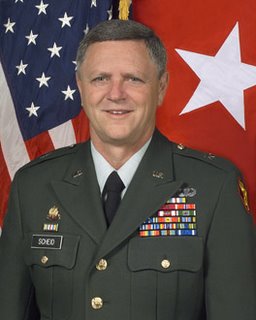
Even for many backers of the war in Iraq, the management of the United States occupation of that country has been troubling. Some war supporters – or at least those who aren’t merely blindly partisan – have gone so far as to term that management incompetent, but also used it as the basis for an argument that the invasion was a great idea whose follow-up has merely been poorly executed. Opponents of the war, meanwhile, have called the occupation not just incompetent, but criminally negligent in its failure.
This might seem like an exercise in semantics over a relatively small point, but it is in fact important. If Secretary of Defense Donald Rumsfeld and the war planners merely made good-faith errors in judgement, a significant amount of the criticism leveled at them disappears, and some of the questions about the Bush Administration’s mindset in planning and executing foreign policy become more cloudy. Certainly, there has been recognition of disagreement among Pentagon leadership, most notably between the Secretary of Defense and former Army Chief of Staff General Eric Shinseki, but even that can be chalked up to divergent philosophies, with Shinseki representing an old guard mentality in conflict with Rumsfeld’s belief in a lighter, faster force. Even Rumsfeld's firing of Shinseki after the general testified before Congress that hundreds of thousands of troops would be required to properly secure Iraq - rather than the 150,000 or so that were actually commited - can be atttributed to cleaning house in an effort to get everybody on the same page at the Department of Defense.
This might seem like an exercise in semantics over a relatively small point, but it is in fact important. If Secretary of Defense Donald Rumsfeld and the war planners merely made good-faith errors in judgement, a significant amount of the criticism leveled at them disappears, and some of the questions about the Bush Administration’s mindset in planning and executing foreign policy become more cloudy. Certainly, there has been recognition of disagreement among Pentagon leadership, most notably between the Secretary of Defense and former Army Chief of Staff General Eric Shinseki, but even that can be chalked up to divergent philosophies, with Shinseki representing an old guard mentality in conflict with Rumsfeld’s belief in a lighter, faster force. Even Rumsfeld's firing of Shinseki after the general testified before Congress that hundreds of thousands of troops would be required to properly secure Iraq - rather than the 150,000 or so that were actually commited - can be atttributed to cleaning house in an effort to get everybody on the same page at the Department of Defense.
 As it turns out however, this argument has now been settled, and it has been settled, in of all places, the pages of the Hampton Roads Daily Press. In a September 8th article, Army Brigadier General Mark Scheid, the commander of the Army Transportation Corps and a logistics planner for American deployments in Bosnia, Afghanistan and Iraq, spoke candidly about the challenges associated with the overthrow of Saddam Hussein. In addressing post-invasion planning, General Scheid states flatly that Mr. Rumsfeld expressly forbade addressing a scenario in which U.S. forces were in-country for an extended period of time:
As it turns out however, this argument has now been settled, and it has been settled, in of all places, the pages of the Hampton Roads Daily Press. In a September 8th article, Army Brigadier General Mark Scheid, the commander of the Army Transportation Corps and a logistics planner for American deployments in Bosnia, Afghanistan and Iraq, spoke candidly about the challenges associated with the overthrow of Saddam Hussein. In addressing post-invasion planning, General Scheid states flatly that Mr. Rumsfeld expressly forbade addressing a scenario in which U.S. forces were in-country for an extended period of time:"The secretary of defense continued to push on us... that everything we write in our plan has to be the idea that we are going to go in, we're going to take out the regime, and then we're going to leave," Scheid said. "We won't stay."What this says about Donald Rumsfeld is deeply disturbing. The fact that he was apparently more concerned with public perception of the invasion than with ensuring that all reasonable outcomes were adequately planned is bad enough, but his cavalier attitude toward the men and women for whom he is responsible is even more appalling. This is more than just criminal negligence, this is an utter contempt for the lives and well-being of American service people manifested in a willful blindness that is head-spinning in its arrogance.
Scheid said the planners continued to try "to write what was called Phase 4," or the piece of the plan that included post-invasion operations like occupation.
Even if the troops didn't stay, "at least we have to plan for it," Scheid said.
"I remember the Secretary of Defense saying that he would fire the next person that said that," Scheid said. "We would not do planning for Phase 4 operations, which would require all those additional troops that people talk about today.
"He said we will not do that because the American public will not back us if they think we are going over there for a long war."
In the wake of the failed occupation of Iraq and the scandal of Abu Ghraib the question"Why does Donald Rumsfeld still have a job?" was asked even by mainstream media outlets like The Economist, and a recent no-confidence vote on his tenure as Secretary of Defense was only avoided because the GOP controls the Senate. Based on the statements of General Sheid, the more proper question is "Why isn't Donald Rumsfeld being prosecuted?"
No comments:
Post a Comment